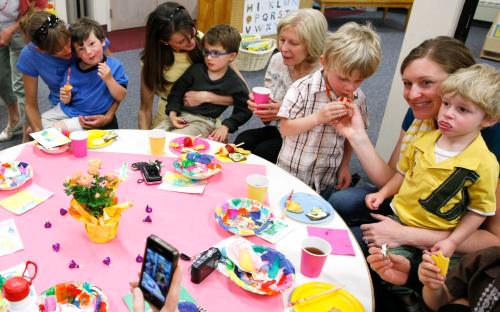Five decades of research show that high-quality preschool works, with the most recent evidence from North Carolina. Nevertheless, debate about whether and how much to invest in early childhood persists, more recently centering on the issue of scaling up with quality. One piece of opposing evidence comes from the Tennessee Voluntary Prekindergarten evaluation, which reported that the effect of preschool began to fade by the end of kindergarten. And by the end of third grade, the control group used for comparison outperformed the students who got the treatment originally. Lead researchers for the Tennessee study warn that there is an over-reliance on small efficacy studies conducted decades ago, such as HighScope Perry Preschool, as evidence for large-scale expansion of publicly funded preschools. The researchers also caution, “The idea that pre‐k can be scaled up quickly, cheaply, and without professional support or vision is certainly bound to be incorrect.”
We agree that caution is warranted, as scaling up programs hastily can compromise program quality. We also recognize that the challenge of balancing budget and expanding access–while maintaining quality–is real for many states, given quality is expensive. However, research is clear that not just any preschool, but high-quality preschools, are what we know to be effective. Here, we describe the results from Michigan to illustrate that it is indeed possible to successfully scale up high-quality programs statewide.
In Michigan, the positive results of a homegrown HighScope Perry Preschool initially helped pave the way for the implementation of a state-funded preschool for at-risk four-year-olds. For example, former state Rep. Gary Owen, Democratic speaker of the Michigan House of Representatives from 1983 to 1988, strongly advocated establishing programs like Perry Preschool. In 1984, then-Gov. Jim Blanchard proposed the funding, and in 1985, the Michigan School Readiness Program (MSRP) began serving students. (The program continues today as the Great Start Readiness Program, GSRP.)
An independent program evaluation for GSRP was funded in 1995 and contracted to HighScope through a competitive process. The GSRP evaluation is currently the only state-funded preschool evaluation that followed children through high school graduation, providing unique insight into the long-term effect of large-scale, early childhood programming for at-risk children. A matched comparison quasi-experimental design was chosen, and children were sampled from geographically and demographically representative GSRP programs across Michigan.[1] An experimental design was not used due to ethical and legal concerns.
At every stage (kindergarten entry, second grade, fourth grade, middle school, high school graduation), GSRP participants outperformed comparison groups on school success indicators, most prominent being grade retention.[2] At high school graduation, students who participated in GSRP also graduated on time significantly more than those who did not participate.
In 2012, the Michigan Department of Education and HighScope jointly released the high school graduation results. The release came at a perfect time for state advocacy groups pushing for investment in early childhood education. Their campaign successfully translated the GSRP evaluation, created a sense of urgency that nearly 30,000 children would be deprived of the opportunity to participate in a preschool program with demonstrated positive long-term effects, and mobilized the legislature to approve an unprecedented $130 million GSRP expansion across two years.
Given the quick growth of the program, both initially and again in the more recent investment, one may reasonably question whether quality has been maintained over the program’s history, now spanning three decades. Quality has always been at the forefront of GSRP. Just one year after the program began, in 1986, the Michigan State Board of Education approved the “Standards of Quality and Curriculum Guidelines for Preschool Programs for Four Year Olds.” In 1997, HighScope created the “Program Quality Assessment” (PQA) to monitor implementation of the standards. Currently, GSRP programs conduct the PQA three times throughout the year. As part of the GSRP evaluation, annual PQA analyses show that program quality has been consistently high statewide, even throughout the recent expansion.[3]
Access to preschool is important, and more than one third of the country’s four-year-olds are missing out on this educational opportunity. But, as research has amply demonstrated, we cannot take “quality” out of high-quality preschools for them to truly work. The experience of GSRP shows that quality and expanded access do not have to be at odds. Much work is still left to be done in Michigan, too, including increasing quality across all licensed childcare programs and providers, and expanding state-funded programs for three-year-olds. As preschool programs expand, we should place quality at the forefront to help students—and the public—realize the high return on investment possible in these programs.
Footnotes
[1] Detroit, Grand Rapids, Grayling, Kalamazoo, Muskegon, and Port Huron.
[2] Daniel-Echols, M., and Schweinhart, L. (2007). Lessons from the Evaluation of the Michigan School Readiness Program. Prepared for the National Invitational Conference of the Early Childhood Research Collaborative, December 7, 2007; Florian, J.E., Schweinhart, L.J., & Epstein, A.S. (1997). Early returns: First-year report of the Michigan School Readiness Progrem evaluation. Ypsilanti, MI: HighScope Educational Research Foundation; Xiang, Z., & Schweinhart, L. J. (2002). Effects five years later: The Michigan School Readiness Program evaluation through age 10. Ypsilanti, MI: HighScope Educational Research Foundation; Xiang, Z., Schweinhart, L..J., Hohmann, C., Smith, C., Storer, E., & Oden, S. (2000). Points of light: Third-year report of the Michigan School Readiness Program evaluation. Ypsilanti, MI: HighScope Educational Research Foundation.
[3] Additional quality monitoring activities implemented by the Michigan Department of Education include requirements for master-level early childhood specialists to serve as coaches for every classroom, and department consultants who have additional oversights. See GSRP Implementation Manual.
Editor’s Note: Tomoko Wakabayashi is a consultant to HighScope Educational Research Foundation, where she was the founding director of the HighScope Center for Early Education Evaluation and served as the director of research until fall 2016. She served as the principal investigator for the Great Start Readiness Program Evaluation during her tenure at HighScope. Richard Lower is responsible for the administration of the Great Start Readiness Program, Early Childhood Special Education, and 21st Century Community Learning Centers. Prior to joining the Michigan Department of Education, he served as the executive director of the Michigan Head Start Association. Beth Hardin oversees the data collection effort of the Great Start Readiness Program Evaluation. She has been involved in this evaluation work since 1998.





Commentary
High-quality, statewide preschool is possible–just look to Michigan
January 25, 2017